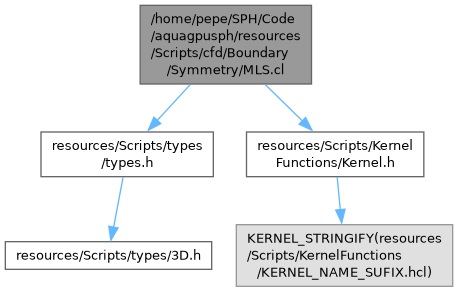Particles interactions computation. More...
Include dependency graph for MLS.cl:

Macros | |
| #define | __CLEARY__ 10.f |
| #define | _MLS_ mls[i] |
Functions | |
| __kernel void | entry (const __global int *imove, const __global int *imirrored, const __global vec *r, const __global vec *rmirrored, const __global float *rho, const __global float *m, __global matrix *mls, __global uint *icell, __global uint *ihoc, uint N, uivec4 n_cells) |
| Compute the MLS transformation matrix inverse, \( L_i^{-1} \), due to the particles at the other side of the symmetry plane. | |
Detailed Description
Particles interactions computation.
Macro Definition Documentation
◆ __CLEARY__
| #define __CLEARY__ 10.f |
◆ _MLS_
| #define _MLS_ mls[i] |
Function Documentation
◆ entry()
| __kernel void entry | ( | const __global int * | imove, |
| const __global int * | imirrored, | ||
| const __global vec * | r, | ||
| const __global vec * | rmirrored, | ||
| const __global float * | rho, | ||
| const __global float * | m, | ||
| __global matrix * | mls, | ||
| __global uint * | icell, | ||
| __global uint * | ihoc, | ||
| uint | N, | ||
| uivec4 | n_cells | ||
| ) |
Compute the MLS transformation matrix inverse, \( L_i^{-1} \), due to the particles at the other side of the symmetry plane.
Such transformation matrix can be multiplied by the kernel gradient to produce a new kernel gradient, \( \nabla W^{L}_{ij} = L_i \cdot \nabla W_{ij} \), such that the lienar fields differential operators are consistently computed.
- Parameters
-
imove Moving flags. - imove > 0 for regular fluid particles.
- imove = 0 for sensors.
- imove < 0 for boundary elements/particles.
imirrored 0 if the particle has not been mirrored, 1 otherwise. r Position \( \mathbf{r} \). rmirrored Mirrored position of the particle, r if imirrored is false (0). rho Density \( \rho \). m Mass \( m \). mls Kernel MLS transformation matrix \( L \). icell Cell where each particle is located. ihoc Head of chain for each cell (first particle found). N Number of particles. n_cells Number of cells in each direction
- Note
- The MLS kernel transformation will be computed just for the particles with the moving flag mls_imove, and using just the information of the particles with the moving flag mls_imove
Here is the call graph for this function:
